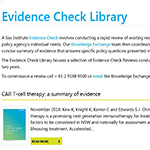
The Sax Institute’s contribution to the knowledge base through its popular Evidence Check Library continues to grow, with new Evidence Checks recently published on topics including management of health and wellbeing in the workplace, and another on a promising next-generation cancer treatment.
The workplace health Evidence Check, conducted for SafeWork NSW, found strong evidence that lifestyle management programs in workplaces are effective in helping people quit smoking and exercise more, and that these benefits were often sustained over time rather than being short-term. Programs to help reduce overweight, obesity and type 2 diabetes are most effective if they last at least four months and implement an existing well-structured program. There was also strong evidence that a workplace-based resistance training exercise program helped prevent and manage upper body musculoskeletal disorders and symptoms. The review found that every dollar invested in these programs yielded an annual return of $3.20, with a range of $1.40 to $4.60. The review said there was “promising evidence that even higher returns” could be found when programs incorporated newer technologies such as telephone coaching of high-risk individuals combined with financial incentives. However, it also identified barriers, which include lacklustre management support, outsourcing of staff, and organisational size and culture.
Meanwhile, a separate Evidence Check review for NSW Health looked at the evidence for Chimeric Antigen Receptor (CAR) T-cell therapy, a treatment in which a cancer patient’s immune cells are genetically engineered to help them attack cancerous tissue. The treatment is an advanced therapy for cancers such as leukaemia and lymphoma, but while some promising results have been recorded, the treatment is also extremely expensive, costing $US350,000 to $US500,000 per patient. The UK’s National Institute of Health and Care Excellence recently recommended for the first time that the UK government start to fund a CAR T-cell therapy for adults with some types of non-Hodgkin’s lymphoma, but CAR T-cell therapy is only available to patients in NSW as part of a clinical trial. The review, conducted by experts from the UK-based BMJ Technology Assessment Group, found “substantial efficacy benefits” of CAR T-cell therapies for B-cell malignancies, with the biggest benefits for patients with acute lymphoblastic leukaemia, chronic lymphocytic leukaemia and non-Hodgkin’s lymphoma. The review noted that the durability of treatment effects is unknown, limiting the evidence on cost-effectiveness.





